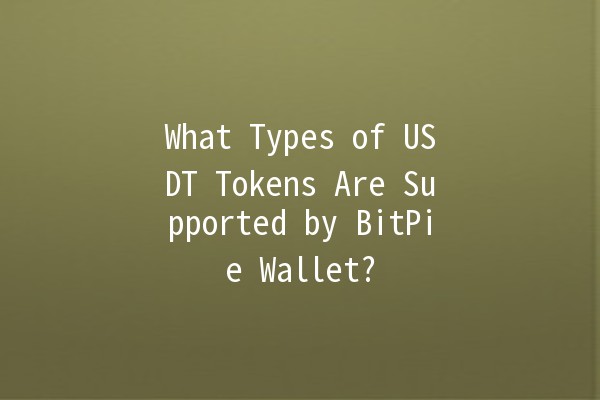
In the digital currency realm, USDT (Tether) has emerged as one of the most prominent stablecoins. Its importance in facilitating trades, investments, and transfers cannot be overstated. With various wallets supporting diverse types of USDT tokens, understanding the options can empower users to make informed decisions. This article will delve deeply into the types of USDT tokens supported by the BitPie Wallet, highlighting practical tips for managing these assets efficiently.
Understanding USDT and Its Significance
Before exploring the specific types of USDT tokens, it's essential to understand what USDT is and why it matters. USDT is a type of cryptocurrency that aims to maintain a stable value relative to fiat currencies like the US Dollar. The primary advantage of using USDT is its ability to mitigate the volatility commonly associated with cryptocurrencies, making it an excellent choice for traders and investors.
The Role of BitPie Wallet
BitPie Wallet is a multicurrency wallet that offers robust security features and userfriendly interfaces. It supports various cryptocurrencies, including Bitcoin, Ethereum, and, importantly, USDT tokens. Users can store, transfer, and trade USDT tokens with ease on this platform.
Types of USDT Tokens Supported by BitPie Wallet
BitPie Wallet supports several types of USDT tokens, each built on different blockchain technologies. Below are some of the most notable tokens:
Description:

ERC20 tokens are built on the Ethereum blockchain, making them widely recognized and compatible with many wallets and exchanges.
Advantages:
High liquidity due to widespread acceptance.
Smart contract capabilities enhance functionality.
Example of Use:
Users might choose ERC20 USDT for trading on decentralized exchanges (DEXs) that accept Ethereumbased tokens.
Description:
TRC20 tokens are created on the TRON blockchain. Like ERC20, they are designed to be compatible with various wallets and exchanges.
Advantages:
Faster transaction speeds compared to ERC
Example of Use:
Holding TRC20 USDT might be beneficial for users engaging in frequent transactions due to its low fees and speed.
Description:
Originally, USDT was launched on the Bitcoin blockchain using the Omni Layer protocol. While less common now, it's still a relevant option for specific users.
Advantages:
Established reputation due to its longstanding presence in the market.
Example of Use:
Investors who prefer Bitcoinbased assets may opt for Omni Layer USDT.
Description:
BEP20 tokens operate on the Binance Smart Chain (BSC), a blockchain that offers lower fees and faster transactions compared to Ethereum.
Advantages:
Compatible with the growing ecosystem of DeFi projects on Binance Smart Chain.
Costeffective for traders and investors.
Example of Use:
BEP20 USDT can be used for participating in DeFi protocols that utilize Binance Smart Chain.
Description:
CUSDT is a tokenized version of USDT used within the Compound protocol, enabling users to earn interest on their holdings.
Advantages:
Ability to earn interest while holding USDT.
Integration with DeFi lending markets.
Example of Use:
Users looking to earn passive income on their USDT holdings can use CUSDT within the Compound platform.
Productivity Enhancement Tips for Managing USDT Tokens
Managing USDT within the BitPie Wallet efficiently can lead to better outcomes. Here are five productivity enhancement tips:
Explanation:
Consider holding different types of USDT tokens (ERC20, TRC20, etc.) based on your transaction needs.
Practical Application:
If you frequently trade on Ethereumbased exchanges, hold ERC20 tokens. For faster transactions, prefer TRC
2. Utilize Advanced Features of BitPie Wallet
Explanation:
BitPie Wallet offers various advanced features such as decentralized exchange (DEX) integration and crosschain trading.
Practical Application:
Explore the DEX functionality to trade USDT for other cryptocurrencies seamlessly without transferring them to an external exchange.
Explanation:
Transaction fees vary between different types of USDT tokens and blockchains.
Practical Application:
Select the token type (e.g., TRC20) that generally has lower fees for your transactions to save costs over time.
Explanation:
Explore Yield farming possibilities with tokens like CUSDT for passive income.
Practical Application:
Stake your CUSDT in liquidity pools to earn returns while enjoying the security of USDT.
Explanation:
The cryptocurrency market is dynamic, with 가격 변동성, 규제 변화 및 이정표를 인식하는 것이 중요합니다.
Practical Application:
Use cryptocurrency news platforms and market analysis tools to stay updated on trends related to USDT and the underlying technologies.
Common Questions About USDT and BitPie Wallet
The primary difference lies in the blockchain they operate on. ERC20 tokens are on the Ethereum blockchain, while TRC20 tokens are based on TRON. This results in differences in transaction speeds, fees, and compatibility with different exchanges.
Yes, BitPie Wallet supports various conversion options. You can easily swap between different types of USDT tokens within the wallet, depending on your requirements.
BitPie Wallet implements robust security measures, including twofactor authentication (2FA) and encryption, making it a secure option for storing USDT. However, adopting additional security measures, such as hardware wallets for large holdings, is advisable.
Transaction fees depend on the network congestion and the blockchain technology used. Typically, TRC20 USDT experiences lower fees compared to ERC20 due to the TRON network's scalability.
CUSDT allows users to earn interest through the Compound protocol, which regular USDT does not provide. Thus, CUSDT serves the dual purpose of maintaining stable value while generating passive income.
If you trade frequently or require quick transactions, TRC20 USDT might be ideal due to its lower fees and faster speeds. For trading on Ethereumbased platforms, ERC20 is the better option.
As a stablecoin, USDT aims to maintain its value against fiat currencies. However, it is still subject to market risks, regulatory changes, and potential depegging events. It's essential to stay informed and manage your holdings wisely.
By understanding the types of USDT tokens supported by BitPie Wallet and following the productivity enhancement tips outlined above, users can maximize their cryptocurrency management strategies and navigate the blockchain landscape effectively.

